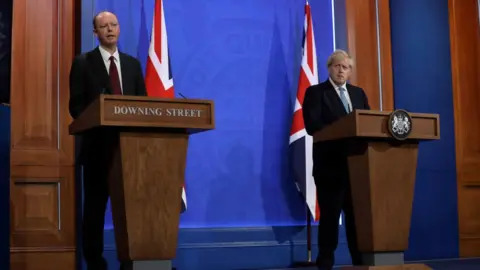Covid inquiry starts to examine Boris Johnson's pandemic decisions
 Getty Images
Getty ImagesThe UK inquiry into the handling of the Covid-19 pandemic has started to investigate decisions made by prime minister Boris Johnson and his senior advisers in early 2020.
Key players including Mr Johnson and former health secretary Matt Hancock are likely to appear in person at hearings next summer.
Decisions over the timing of lockdown and testing delays will be scrutinised.
The inquiry was recently widened to include a focus on children.
The latest area of the inquiry's investigations, known as Module 2, will focus on decisions and announcements made by the UK government at Westminster between early January and late March 2020.
During this stage, official documents will be sought and evidence on government decision-making will be examined.
Later, the inquiry will also look at how decisions were made up until early 2022, and the handling of the pandemic in Scotland, Wales and Northern Ireland.
Sir Chris Whitty, the UK government's chief medical adviser during the pandemic, and Sir Patrick Vallance, chief scientific adviser, are also likely to appear before the inquiry. Mr Johnson's former aide Dominic Cummings is also expected to appear.
Module 1, launched in July, is examining the resilience and preparedness of the UK for a pandemic before 2020.
Formal hearings with witnesses are set to start next spring, and the inquiry is inviting individuals or organisations with a specific interest, known as core participants, to register.
This will allow them to get access to relevant evidence and make statements at hearings.
Baroness Heather Hallett, who is chairing the inquiry, said: "My team and I will establish what was understood about Covid-19 at the time, what information was available in each of the four UK nations and how and why key decisions were made, especially early in the pandemic.
"I will be taking evidence next year to build a full picture of the challenges faced by the government and how it chose to confront them."
The inquiry will hold preliminary hearings in the autumn. They are likely to involve lawyers representing different parties, including those who have registered as core participants.
The Covid-19 Bereaved Families for Justice group, commenting at the start of the inquiry, has said for it to be successful "our experiences need to be at the heart of the entire process, be that the research they're commissioning, the evidence being gathered or the hearings themselves".
There have been reports that the cost of the inquiry has already topped £80m because of contracts signed with law firms and other advisers.
But this, reportedly, includes all government departments involved in the pandemic response.
It is understood that legal bills for the inquiry team itself will be about £8m.
On Wednesday, the UK's Covid alert was downgraded from level three to level two - meaning the virus is in general circulation, but healthcare pressures and transmission "are declining or stable".